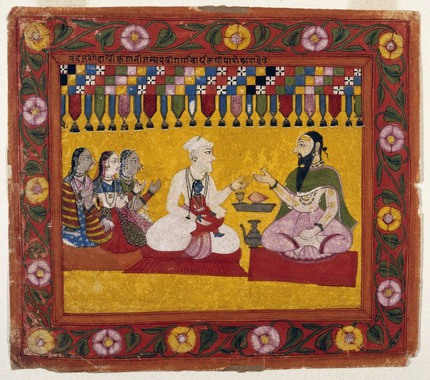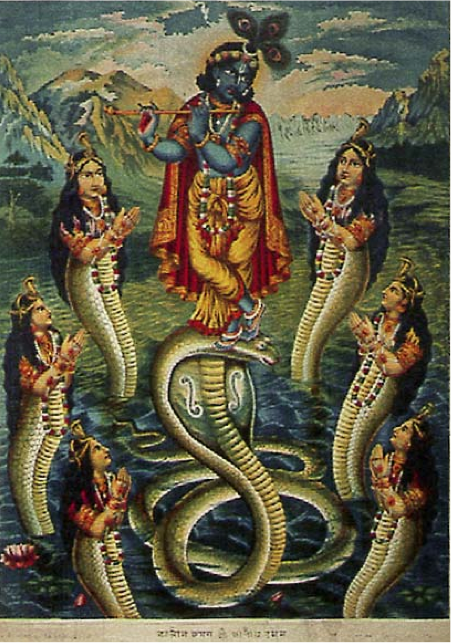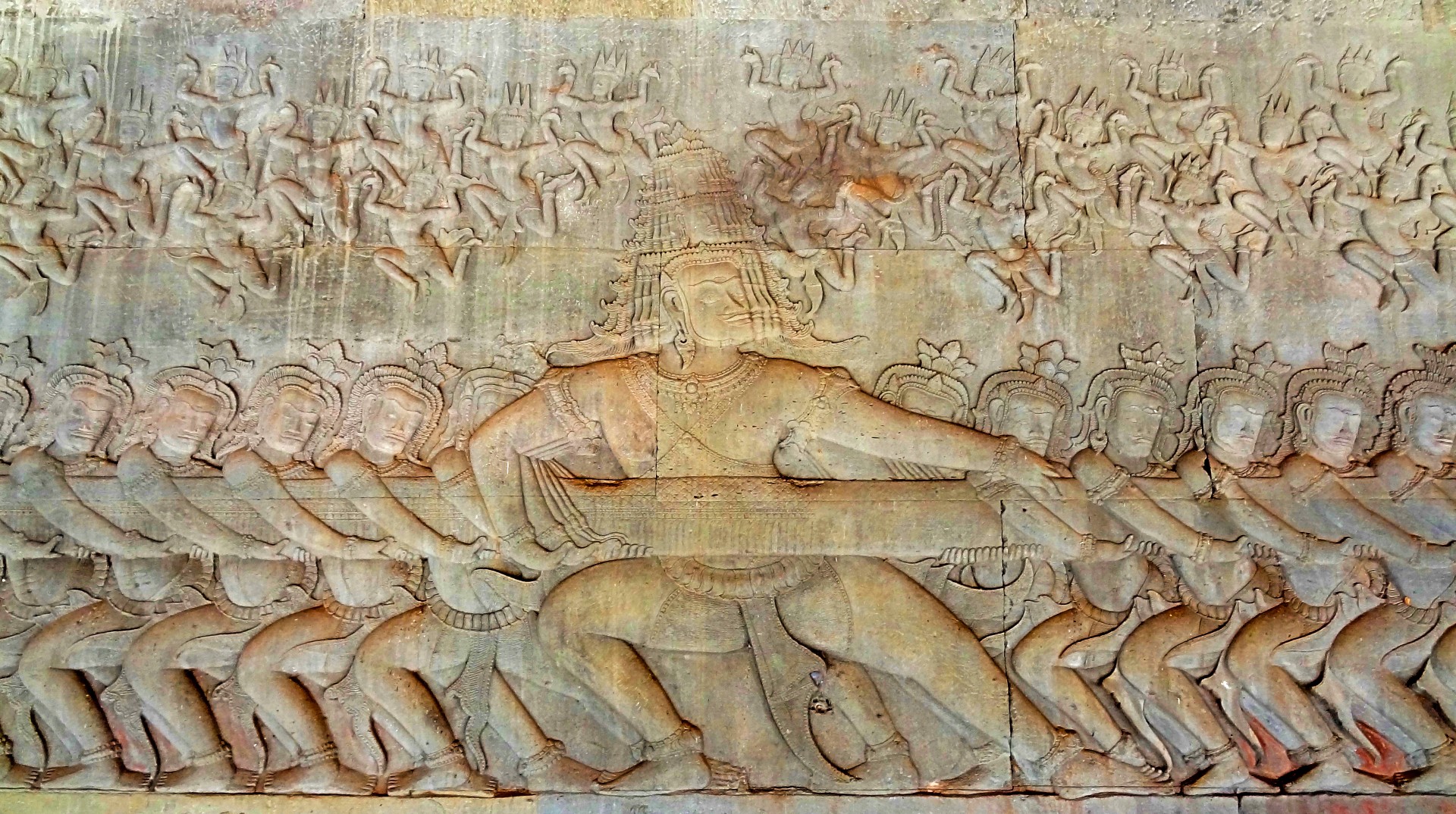|
Nand Baba
Nanda () is a cow-herd chief, and the foster-father of Krishna, featured in the Harivamsha and the Puranas. Nanda is the son of Parjanya, a ruler of the Vraja region, who is a son of the Yadava king, Devamida. He is the chief of Gokulam, which is one of the most powerful territories of the Yadava tribe. He is sometimes referred to as a king. Nanda is the cousin of Vasudeva. Vasudeva takes his newborn son, Krishna, to Nanda on the night of the child's birth, so that Nanda could raise him. The chief, who is married to Yashoda, brings up both Krishna, and his brother, Balarama. Krishna derives his epithet ''Nandanandana'' (son of Nanda) from him. Legend Nanda was the foster-father of Krishna. He also helped to raise Balarama. Nanda, identified as King Nanda in many scriptures was a kinsman and a great friend of Vasudeva. The fact that King Nanda and King Vasudeva were cousins is confirmed both by the Bhagavata Purana, Book 10, and the Mahabharata. King Vasudeva married Devaki, the ... [...More Info...] [...Related Items...] OR: [Wikipedia] [Google] [Baidu] |
Yashoda
Yashoda ( sa, यशोदा, translit=Yaśodā) is the foster-mother of Krishna and the wife of Nanda Baba, Nanda. She is described in the Puranic texts of Hinduism as the wife of Nanda Baba, Nanda, the chieftain of Gokul, Gokulam, and the sister of Rohini Devi, Rohini. According to the Bhagavata Purana, Krishna was born to Devaki, but Krishna's father, Vasudeva Anakadundubhi, Vasudeva, brought the newborn Krishna to his cousin Nanda (Hinduism), Nanda, and his wife, Yashoda, in Gokul, Gokulam. This was for his upbringing, as well as to protect Krishna from Devaki's brother, Kamsa, the tyrannical king of Mathura, Uttar Pradesh, Mathura. Etymology The name Yashoda means 'one who is giver (da, ) of fame or glory (Yash, )'. Legends Origin According to the ''Bhagavata Purana'', Yashoda was the incarnation of Dhara, the wife of the Vasu, Drona. Little is known about Yashoda's early life, other than her marriage with Nanda Baba, Nanda. Yashoda's Father Sri Sumukha was the tre ... [...More Info...] [...Related Items...] OR: [Wikipedia] [Google] [Baidu] |
Bhagavat Purana
The ''Bhagavata Purana'' ( sa, भागवतपुराण; ), also known as the ''Srimad Bhagavatam'', ''Srimad Bhagavata Mahapurana'' or simply ''Bhagavata'', is one of Hinduism's eighteen great Puranas (''Mahapuranas''). Composed in Sanskrit by Veda Vyasa, it promotes '' bhakti'' (devotion) towards Krishna, integrating themes from the Advaita (monism) philosophy of Adi Shankara, the Vishishtadvaita (qualified monism) of Ramanujacharya and the Dvaita (dualism) of Madhvacharya. It is widely available in almost all Indian languages. The ''Bhagavata Purana'', like other puranas, discusses a wide range of topics including cosmology, astronomy, genealogy, geography, legend, music, dance, yoga and culture. As it begins, the forces of evil have won a war between the benevolent ''devas'' (deities) and evil ''asuras'' (demons) and now rule the universe. Truth re-emerges as Krishna, (called "Hari" and "Vāsudeva" in the text) – first makes peace with the demons, understands the ... [...More Info...] [...Related Items...] OR: [Wikipedia] [Google] [Baidu] |
Parvati
Parvati ( sa, पार्वती, ), Uma ( sa, उमा, ) or Gauri ( sa, गौरी, ) is the Hindu goddess of power, energy, nourishment, harmony, love, beauty, devotion, and motherhood. She is a physical representation of Mahadevi in her complete form. She is also revered in her appearances as Durga and Kali.Suresh Chandra (1998), Encyclopedia of Hindu Gods and Goddesses, , pp 245–246 She is one of the central deities of the goddess-oriented sect called Shaktism, and the chief goddess in Shaivism. Along with Lakshmi and Saraswati, she forms the Tridevi. Parvati is the wife of the Hindu god Shiva. She is the reincarnation of Sati, the first wife of Shiva who immolated herself during a yajna (fire-sacrifice).Edward Balfour, , The Encyclopaedia of India and of Eastern and Southern Asia, pp 153 Parvati is the daughter of the mountain-king Himavan and queen Mena.H.V. Dehejia, Parvati: Goddess of Love, Mapin, , pp 11 Parvati is the mother of the Hindu deities Ganesha and ... [...More Info...] [...Related Items...] OR: [Wikipedia] [Google] [Baidu] |
Shiva
Shiva (; sa, शिव, lit=The Auspicious One, Śiva ), also known as Mahadeva (; ɐɦaːd̪eːʋɐ, or Hara, is one of the principal deities of Hinduism. He is the Supreme Being in Shaivism, one of the major traditions within Hinduism. Shiva is known as "The Destroyer" within the Trimurti, the Hindu trinity which also includes Brahma and Vishnu. In the Shaivite tradition, Shiva is the Supreme Lord who creates, protects and transforms the universe. In the goddess-oriented Shakta tradition, the Supreme Goddess ( Devi) is regarded as the energy and creative power (Shakti) and the equal complementary partner of Shiva. Shiva is one of the five equivalent deities in Panchayatana puja of the Smarta tradition of Hinduism. Shiva has many aspects, benevolent as well as fearsome. In benevolent aspects, he is depicted as an omniscient Yogi who lives an ascetic life on Mount Kailash as well as a householder with his wife Parvati and his three children, Ganesha, Kartikeya and A ... [...More Info...] [...Related Items...] OR: [Wikipedia] [Google] [Baidu] |
Kaliya
Kaliya (IAST: Kāliya, Devanagari: कालिय), in Hindu traditions, was a venomous Nāga living in the Yamunā river, in Vṛndāvana. The water of the Yamunā for four leagues all around him boiled and bubbled with poison. No bird or beast could go near, and only one solitary Kadamba tree grew on the river bank. The celebration of Nāga Nathaiyā or Nāga Nṛitya is associated with the tale of Lord Krishna dancing upon and subduing Kāliya. Story The story of Krishna and Kāliya is told in the sixteenth chapter of the Tenth Canto of the ''Bhagavata Purana''. The proper home of Kāliya was the island of Ramaṇaka, but he had been driven away from there in fear of Garuḍa, the foe of all serpents. Garuḍa had been cursed by the yogi Saubhari dwelling at Vrindavan so that he could not come to Vrindavan without meeting his death. Therefore, Kāliya chose Vrindavan as his residence, knowing it was the only place where Garuḍa could not come. Once, the sage Durva ... [...More Info...] [...Related Items...] OR: [Wikipedia] [Google] [Baidu] |
Ishvara
''Ishvara'' () is a concept in Hinduism, with a wide range of meanings that depend on the era and the school of Hinduism.Monier Monier Williams, Sanskrit-English dictionarySearch for Izvara University of Cologne, Germany In ancient texts of Hindu philosophy, depending on the context, ''Ishvara'' can mean supreme Self, ruler, lord, king, queen or husband. In medieval era Hindu texts, depending on the school of Hinduism, ''Ishvara'' means God, Supreme Being, personal God, or special Self. ''Ishvara'' is primarily an epithet of Shiva.James Lochtefeld, "Ishvara", The Illustrated Encyclopedia of Hinduism, Vol. 1: A–M, Rosen Publishing. , page 306 In Shaivism, ''Ishvara'' is an epithet of Shiva. For many Vaishnavas, it is synonymous with Vishnu, like in his epithet of Venkateswara. In traditional Bhakti movements, ''Ishvara'' is one or more deities of an individual's preference ( Iṣṭa-devatā) from Hinduism's polytheistic canon of deities. In modern-day sectarian movements suc ... [...More Info...] [...Related Items...] OR: [Wikipedia] [Google] [Baidu] |
Varuna
Varuna (; sa, वरुण, , Malay: ''Baruna'') is a Vedic deity associated initially with the sky, later also with the seas as well as Ṛta (justice) and Satya (truth). He is found in the oldest layer of Vedic literature of Hinduism, such as hymn 7.86 of the ''Rigveda''. He is also mentioned in the Tamil grammar work '' Tolkāppiyam'', as Kadalon the god of sea and rain. He is said to be the son of Kashyapa (one of the seven ancient sages). In the Hindu Puranas, Varuna is the god of oceans, his vehicle is a Makara (crocodile) and his weapon is a Pasha (noose, rope loop). He is the guardian deity of the western direction. In some texts, he is the father of the Vedic sage Vasishtha. Varuna is found in Japanese Buddhist mythology as Suiten. He is also found in Jainism. Etymology In Hindu tradition, the theonym ''Váruṇa'' (Devanagari: वरुण) is described as a derivation from the verbal root ''vṛ'' ("to surround, to cover" or "to restrain, bind") by means ... [...More Info...] [...Related Items...] OR: [Wikipedia] [Google] [Baidu] |
Asura
Asuras (Sanskrit: असुर) are a class of beings in Indian religions, Indic religions. They are described as power-seeking clans related to the more benevolent Deva (Hinduism), Devas (also known as Suras) in Hinduism. In its Buddhism, Buddhist context, the word is sometimes translated "Titan (mythology), titan", "demigod", or "antigod". According to Hindu texts, Hindu scriptures, the asuras are in constant battle with the devas. Asuras are described in Indian texts as powerful superhuman demigods with good or bad qualities. In early Vedic literature, the good Asuras are called ''Adityas'' and are led by Varuna, while the malevolent ones are called ''Danava (Hinduism), Danavas'' and are led by Vritra. In the earliest layer of Vedic texts Agni, Indra and other gods are also called Asuras, in the sense of their being "lords" of their respective domains, knowledge and abilities. In later Vedic and post-Vedic texts, the benevolent gods are call ... [...More Info...] [...Related Items...] OR: [Wikipedia] [Google] [Baidu] |
Yamuna
The Yamuna (Hindustani language, Hindustani: ), also spelt Jumna, is the second-largest tributary river of the Ganges by discharge and the longest tributary in List of major rivers of India, India. Originating from the Yamunotri Glacier at a height of about on the southwestern slopes of Bandarpunch peaks of the Lower Himalayan Range, Lower Himalaya in Uttarakhand, it travels a total length of and has a Drainage system (geomorphology), drainage system of , 40.2% of the entire Ganges Basin. It merges with the Ganges at Triveni Sangam, Allahabad, which is a site of the Kumbh Mela, a Hindu festival held every 12 years. Like the Ganges, the Yamuna is highly venerated in Hinduism and worshipped as the Yamuna in Hinduism, goddess Yamuna. In Hinduism she is the daughter of the sun god, Surya, and the sister of Yama, the god of death, and so is also known as Yami. According to popular legends, bathing in its sacred waters frees one from the torments of death. It crosses several s ... [...More Info...] [...Related Items...] OR: [Wikipedia] [Google] [Baidu] |
Ekadashi
Ekadashi () is the eleventh lunar day (''tithi'') of each of the two lunar phases which occur in an Vedic calendar month - the '' Shukla Pakṣa'' (the period of the brightening moon also known as the waxing phase) and the ''Kṛṣṇa Pakṣa'' (the period of the fading moon also known as the waning phase) It is according to the Vedic medical texts of Ayurveda and is mentioned in detail in many original treatises such as Charaka Samhita and Susruta Samhita. In Sanatana Dharma, Ekadashi holds great importance. Ekadashi is favourite tithi of Krishna and devotees observe "upvas" to be closer to Krishna. In Nepal and India, Ekadashi is considered a day to cleanse the body, aid repair and rejuvenation and is usually observed by partial or complete fast. High protein and carbohydrate-containing foods such as beans and grains are not consumed by observant people during the fast as it is a day to cleanse the body. Instead, only fruit, vegetables, and milk products are eaten. This p ... [...More Info...] [...Related Items...] OR: [Wikipedia] [Google] [Baidu] |
Rohini (wife Of Vasudeva)
In Hindu mythology, Rohini ( sa, रोहिणी, ) is the first consort of Vasudeva, the sister of Yashoda, and the mother of the Hindu deities Balarama and Subhadra. She plays a prominent role in the upbringing of Krishna. Life Rohini is described as the daughter of the king Bahlika. She is married to Vasudeva, a descendant of Yadu, a Chandravamsha king. Vasudeva also married Devaki, a princess of Mathura. The couple is imprisoned by Devaki's brother Kamsa, soon after their marriage. as a divine prophecy predicted Kamsa's death by Devaki's eighth son. While Vasudeva is imprisoned, Rohini lives at the house of his husband's cousin Nanda, in Vraja. While all previous sons of Devaki are slain, the seventh embryo is transferred to Rohini's womb. Rohini gives birth to Balarama. Krishna, the eighth child of Devaki, was exchanged with the daughter of Nanda and Yashoda in secrecy. Yashoda (foster-mother of Krishna) and Rohini play an important nurturing Krishna and Balarama ... [...More Info...] [...Related Items...] OR: [Wikipedia] [Google] [Baidu] |
Ugrasena
Ugrasena ( sa, उग्रसेन) is a character mentioned in the Hindu epic, Mahabharata. He is the King of Mathura, a kingdom that was established by the powerful fearless Abhira tribes from the Yaduvamsha clan. His son was Kamsa, and Krishna's maternal grandfather, Devaka, was his brother. King Ugrasena was overthrown by Kamsa, and was sentenced to life in prison, along with Kamsa's cousin, Devaki, and her husband, Vasudeva. Krishna reinstalled Ugrasena as the ruler of Mathura once more after defeating his wicked uncle. Mythology According to the Puranas, Kamsa issued an order for the execution of his own father once he grew paranoid of the valour of Krishna and Balarama in Mathura, observing them slay wild elephants that he had released for their murder. He ordered his father to be thrown in the river Kalindi, bound hand and foot. This was among the many reasons that would lead to his nephew slaying him. Krishna treated Ugrasena with honour upon his prestigious welco ... [...More Info...] [...Related Items...] OR: [Wikipedia] [Google] [Baidu] |










